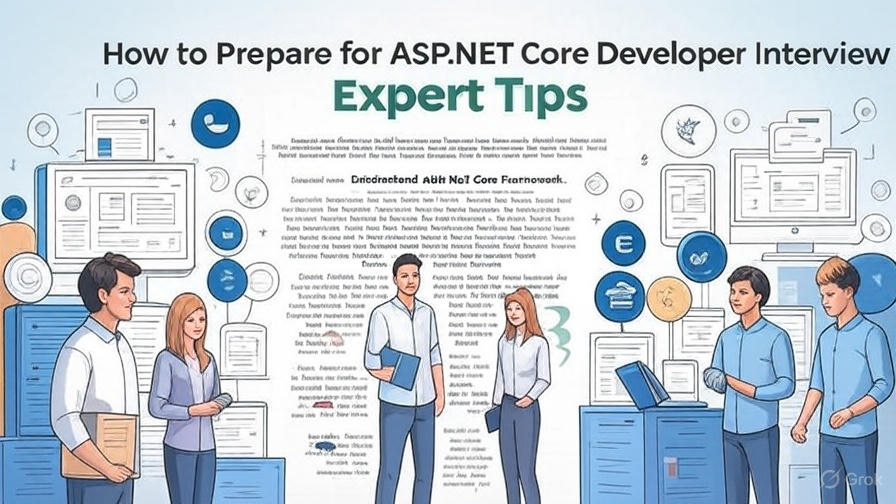How to Prepare for ASP.NET Core Developer Interview
Preparing for an ASP.NET Core developer interview can be a daunting task, but with the right strategy and resources, you can excel. Whether you are a seasoned developer or just starting with asp.net core training, this guide will help you navigate through the preparation process effectively.
Understanding the Basics of ASP.NET Core
Before diving into advanced topics, it’s crucial to have a solid understanding of the basics. ASP.NET Core is a cross-platform, high-performance, open-source framework for building modern, cloud-enabled, Internet-connected applications. Familiarize yourself with its architecture, middleware, dependency injection, and configuration.
Key Concepts to Master
- Middleware: Understand how middleware works in ASP.NET Core. Middleware are software components that are assembled into an application pipeline to handle requests and responses.
- Dependency Injection: This is a fundamental concept in ASP.NET Core. Learn how to register services and inject them into your controllers or other services.
- Configuration: Know how to manage configuration using appsettings.json, environment variables, and other configuration providers.
Deep Dive into Advanced Topics
Once you are comfortable with the basics, it’s time to explore more advanced topics. These topics will not only help you in your interview but also in your day-to-day development tasks.
Advanced Concepts to Focus On
- Entity Framework Core: This is an ORM (Object-Relational Mapping) framework that allows you to work with databases using .NET objects. Understand how to perform CRUD operations, use migrations, and optimize queries.
- Authentication and Authorization: Security is a critical aspect of any application. Learn how to implement authentication and authorization using Identity, JWT (JSON Web Tokens), and other security mechanisms.
- Performance Optimization: Know how to optimize the performance of your ASP.NET Core applications. This includes caching, response compression, and using performance profiling tools.
Practical Experience and Projects
Theory is essential, but practical experience is what will set you apart. Work on real-world projects to apply the concepts you have learned. This will not only reinforce your understanding but also give you something tangible to discuss during your interview.
Tips for Gaining Practical Experience
- Build a Portfolio: Create a portfolio of projects that showcase your skills. This could include web applications, APIs, or even contributions to open-source projects.
- Participate in Hackathons: Hackathons are a great way to gain experience and learn new skills in a short amount of time.
- Contribute to Open Source: Contributing to open-source projects can provide valuable experience and help you understand how large-scale applications are built and maintained.
Mock Interviews and Practice
Practice makes perfect. Conduct mock interviews with friends or colleagues to get comfortable with the interview process. This will help you identify areas where you need improvement and build your confidence.
How to Conduct Effective Mock Interviews
- Prepare Common Questions: Research common ASP.NET Core interview questions and practice answering them. This will help you get comfortable with the types of questions you might encounter.
- Simulate Real Interview Conditions: Try to simulate the conditions of a real interview as closely as possible. This includes timing yourself and practicing in a quiet environment.
- Get Feedback: After each mock interview, ask for feedback. This will help you identify areas where you can improve and make adjustments accordingly.
Staying Updated with the Latest Trends
The field of software development is constantly evolving. Stay updated with the latest trends and updates in ASP.NET Core. Follow blogs, attend webinars, and participate in forums to keep your knowledge current.
Resources to Stay Updated
- Official Documentation: The official ASP.NET Core documentation is a great resource for staying updated with the latest features and best practices.
- Blogs and Articles: Follow blogs and articles from industry experts. This will provide you with insights into the latest trends and developments.
- Webinars and Conferences: Attend webinars and conferences to learn from experts and network with other professionals in the field.
Conclusion
Preparing for an ASP.NET Core developer interview requires a combination of theoretical knowledge, practical experience, and continuous learning. By mastering the basics, diving into advanced topics, gaining practical experience, conducting mock interviews, and staying updated with the latest trends, you can significantly increase your chances of success. Remember, the key to acing your interview is not just knowing the answers but also being able to articulate your thoughts clearly and confidently. Good luck with your preparation for the ASP.NET Core developer interview!
FAQs
What is ASP.NET Core?
ASP.NET Core is a cross-platform, high-performance, open-source framework for building modern, cloud-enabled, Internet-connected applications.
How do I get started with ASP.NET Core?
To get started with ASP.NET Core, you can follow the official documentation, take online courses, and work on small projects to gain practical experience.
What are some common interview questions for ASP.NET Core developers?
Common interview questions for ASP.NET Core developers include topics on middleware, dependency injection, Entity Framework Core, authentication and authorization, and performance optimization.
How can I gain practical experience in ASP.NET Core?
You can gain practical experience by building a portfolio of projects, participating in hackathons, and contributing to open-source projects.
What resources can I use to stay updated with ASP.NET Core?
You can stay updated by following the official documentation, reading blogs and articles from industry experts, and attending webinars and conferences.
How important is it to understand middleware in ASP.NET Core?
Understanding middleware is crucial as it forms the backbone of the request processing pipeline in ASP.NET Core applications.
What is dependency injection and why is it important?
Dependency injection is a design pattern that allows for the development of loosely coupled code. It is important because it makes your code more modular, easier to test, and more maintainable.
How can I optimize the performance of my ASP.NET Core applications?
You can optimize performance by implementing caching, using response compression, and utilizing performance profiling tools to identify and fix bottlenecks.
What is Entity Framework Core?
Entity Framework Core is an ORM (Object-Relational Mapping) framework that allows you to work with databases using .NET objects. It simplifies data access and manipulation.
How do I prepare for an ASP.NET Core developer interview?
To prepare for an ASP.NET Core developer interview, focus on mastering the basics, diving into advanced topics, gaining practical experience, conducting mock interviews, and staying updated with the latest trends.






